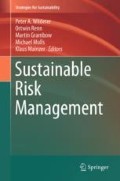Abstract
The assessment of economic growth is a subject of intensive controversy. This controversy is not a new one. In 1967, Mishan outlined the negative consequences of economic growth in his book entitled “The Costs of Economic Growth”. A characteristic feature of the current debate is that the controversy is becoming more diversified through the approaches of proponents and opponents.
References
Acemoglu, D. (2009). Introduction into modern economic growth. Princeton: Oxford University Press.
Ayres, R. (2008). Sustainability economics: Where do we stand? Ecological Economics, 67, 281–310.
den Butter, F. A. G., & Hofges, M. W. (1995). Sustainable development with extractive and non-extractive use of the environment in production. Environmental & Resource Economics, 6(4), 341–358.
Daly, H. E. (1999). Uneconomic growth in theory and in fact, The First Annual Feasta Lecture, Trinity College Dublin 26th April, Feasta Review 1
Daly, H. E. (2005). The Concept of a Steady State Economy. In: M. Redclift (ed.), Sustainability, London, pp. 121–156
Daly, H. E. (2008). A Steady State Economy—A failed growth economy and a steady-state economy are not the same thing; they are the very different alternatives we face, Sustainable Development Commission, UK.
Fratzscher, M. (2016). Verteilungskampf: Warum Deutschland immer ungleicher wird, Munich.
von Hauff, M., & Parlow, A. (2014). CO 2 -Emissions and Economic Growth—A Bounds-testing Cointegration Analysis for German Industries (pp. 37–14). No: Volkswirtschaftliche Diskussionsbeiträge Technische Universität Kaiserslautern.
Hauff, M. von (2015). Wachstum—Die Kontroverse um nachhaltiges Wachstum, Wiesbaden.
Jackson, T. (2005). Live better by consuming less? Is There a “Double Dividend” in Sustainable Consumption? Journal of Industrial Ecology, 9(1–2), 19–36.
Jackson, T. (2013). Wohlstand ohne Wachstum, 2nd ed., Munich.
Kerschner, C. (2008). Economic de-growth vs. the steady-state Economy: Complements or contradiction. In: Fabrice, F., Schneider, F. (eds.), Proceedings of the First International Conference on Economic De-growth for Ecological Sustainability and Social Equity, Paris, pp. 125–130
Mishan, E. J. (1967). The costs of economic growth. London.
OECD—Organisation for Economic Co-operation and Development (2008). Mehr Ungleichheit trotz Wachstum?, Einkommensverteilung und Armut in OECD-Ländern, Paris
OECD—Organization for Economic Co-operation and Development (2011). Divided We Stand: Why Inequality Keeps Rising, Paris
Paqué, K.-H. (2010). Wachstum!. Munich: Die Zukunft des globalen Kapitalismus.
Piketty, T. (2014). Das Kapital im 21. Munich: Jahrhundert.
Reller, A., Marschall, L., Meißner, S., Schmidt, C. (2013). Ressourcenstrategien—Eine Einführung in den nachhaltigen Umgang mit Ressourcen, Darmstadt.
Seidl, I., Zahrnt, A. (2011). Argumente für einen Abschied vom Paradigma des Wirtschaftswachstums. In: I. Seidl & A. Zahrnt (Eds.), Postwachstumsgesellschaft—Konzepte für die Zukunft, Marburg, pp. 23–36
Smith, A. (2005). Untersuchung über Wesen und Ursachen des Reichtums, 1st ed., Tübingen: Translated from the English by M. Streissler and introduced by E.W. Streissler (ed.)
Tichy, G. (2009). Nachhaltiges Wachstum?, in: Forum Wissenschaft & Umwelt (ed.): Nachhaltiges Wachstum? Vienna, pp. 4–9
Veblen, T. (1899). The theory of the leisure class. Dover.
Victor, P., & Rosenbluth, G. (2007). Managing without Growth. Ecological Economics, 61, 492–504.
Victor, P. (2008). Managing without growth. London: Sustainable Development Commission.
Weder die Mauro, B. (2008). Chancen des Wachstums—Globale Perspektiven für Wohlstand von morgen, Frankfurt/New York.
Author information
Authors and Affiliations
Corresponding author
Editor information
Editors and Affiliations
Rights and permissions
Copyright information
© 2018 Springer International Publishing AG
About this chapter
Cite this chapter
von Hauff, M. (2018). Economic Growth: Opportunity or Risk. In: Wilderer, P., Renn, O., Grambow, M., Molls, M., Mainzer, K. (eds) Sustainable Risk Management. Strategies for Sustainability. Springer, Cham. https://doi.org/10.1007/978-3-319-66233-6_3
Download citation
DOI: https://doi.org/10.1007/978-3-319-66233-6_3
Published:
Publisher Name: Springer, Cham
Print ISBN: 978-3-319-66232-9
Online ISBN: 978-3-319-66233-6
eBook Packages: Earth and Environmental ScienceEarth and Environmental Science (R0)

